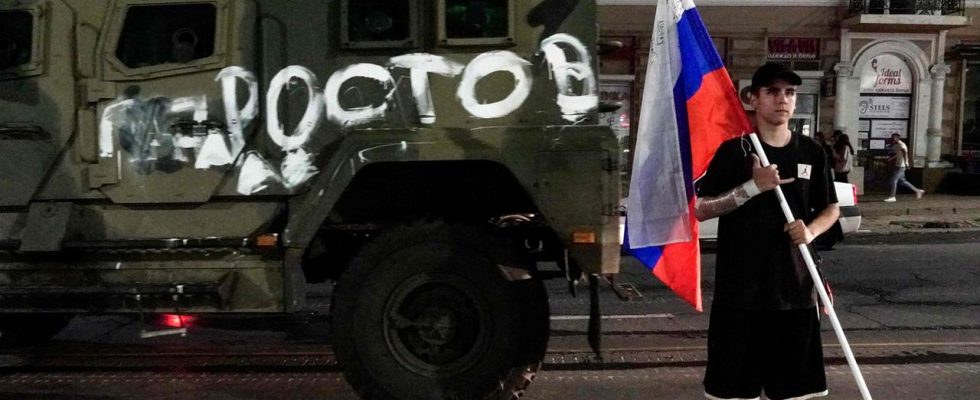More than 24 hours of revolt, then the uprising of the Wagner mercenaries against the leadership in Moscow was suddenly over. Internationally, many governments keep a low profile when it comes to assessing developments in Russia.
Russia’s President Vladimir Putin survived the revolt of the Wagner mercenaries – for the time being. According to US Secretary of State Antony Blinken, however, he raises many questions about Putin’s power. “I think you see cracks appearing that weren’t there before,” Blinken said on US television. “The fact that there is someone inside who is directly challenging Putin’s authority, directly challenging the premises upon which he launched this aggression against Ukraine, that in itself is very, very powerful.”
Asked who in the US government had been in contact with the Russian leadership, Blinken said his team had exchanges with Russian officials over the weekend. However, Blinken repeatedly emphasized that the uprising was an “internal matter” for Russia.
Blinking: “The Latest Chapter in a Book of Failure”
Blinken did not comment explicitly on reports that the US government had already been informed by its secret services about the plans of Wagner boss Yevgeny Prigozhin. “I think it’s been no secret to a lot of people for many months that these tensions were rising, that something was brewing,” he said. It was a “coming storm”. “This is just the latest chapter in a book of failures written by Putin for himself and for Russia,” the minister said.
The insurgency could give Russia-attacked Ukraine an advantage, as Putin now has to worry about what is happening at home, Blinken said.
Previously, the government of US President Joe Biden had been conspicuously reluctant to make public assessments of developments in Russia – like other governments in the West. Most of the explanations simply said that the situation was being monitored.
federal government is reluctant to make statements
In political Berlin, too, little got through to the outside world. At the weekend, Foreign Minister Annalena Baerbock discussed this with her counterparts from the other Western industrialized countries, the G7. The crisis team also met.
Chancellor Olaf Scholz phoned the heads of state of the important allies USA, France and Great Britain. Only Defense Minister Boris Pistorius stated that it was too early to assess what was happening.
The reluctance of the federal government is exactly right, said the FDP defense expert Marie-Agnes Strack-Zimmermann. “It’s an internal Russian issue, so it was wise that the European states didn’t express an opinion on this either,” said the chair of the defense committee on the broadcaster Phoenix.
Strack-Zimmermann also sees signs of Putin’s weakening in the revolt led by Prigoschin. “It could be the first “hairline crack in a system” that is based on oppressing people. The CDU foreign politician Norbert Röttgen made a similar statement. In the “Rheinische Post” he was convinced that the one and a half days of the uprising dealt a severe blow to Putin’s authority.
EU foreign ministers meet on Monday
The foreign ministers of the EU countries want to exchange views on the power struggle in Russia and the possible effects on the war in Ukraine at a meeting in Luxembourg on Monday. Baerbock will also be there. She had actually not wanted to attend the regular EU meeting because of a trip to South Africa, but rescheduled at the weekend in view of the latest developments in Russia.
For the EU, one of the questions that arises is what consequences the power struggle between Prigozhin and Putin could have on conflicts and wars in other countries. In recent years, the Wagner Group has not only been active in Ukraine, but also in countries such as Mali and Libya.
China: “Support Russia’s National Stability”
So far, there have been no official reactions from China to what happened yesterday at close ally Russia. However, it became known that China’s Foreign Minister Qin Gang met with the Russian Deputy Foreign Minister Andrei Rudenko in Beijing. China’s state media then published a short report: Qin and Rudenko spoke accordingly about bilateral relations and other “regional and international matters”. Nothing more was known.
China also promised Russia support in trying to maintain national stability. China’s Foreign Ministry said the Wagner mercenaries’ attempted uprising was a Russian internal matter.
The fact that Prigozhin stopped his advance on Moscow is clearly in the interest of the leadership in Beijing. There is hardly anything that worries them as much as political instability in Russia. Putin is a key ally for the communist leadership in Beijing – largely because of Putin’s anti-American and anti-democratic policies.
statements of solidarity from Latin America
As expected, Russia’s Latin American allies sided with the Kremlin. Cuban President Miguel Díaz-Canel wrote on Twitter on Saturday evening that he expressed the solidarity of the government and people of Cuba with Putin and the Russian “brother people”. “We firmly believe that unity and constitutional order will prevail.” By then, Prigozhin had already given the order to retreat after advancing towards Moscow.
“We send our hugs of solidarity and support to the President of the Russian Federation, Vladimir Putin, who managed to manage an attempt at betrayal and civil war and to guarantee his people victory and peace,” Venezuelan President Nicolás tweeted maduro
An official statement from Central American Nicaragua said President Daniel Ortega and his wife, along with Vice President Rosario Murillo, conveyed “our affection in revolutionary brotherhood” to Putin.
With information from Dietrich Karl Mäurer, ARD capital studio, and Steffen root, SWR

